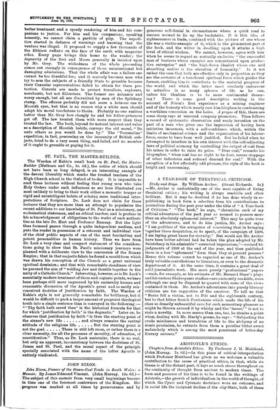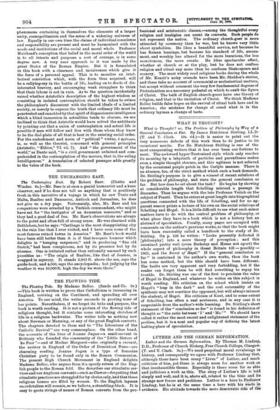ARISTOTLE'S ETHICS.
Chapters from Aristotle's Ethics. By Professor J. H. Muirhead. (John Murray. 7s. 6d.)—In this piece of critical interpretation which Professor Mairhead has given us we welcome a valuable contribution to the cause of practical ethics, in that, while its theme is of the distant past, it lays so much stress throughout on the continuity of thought from ancient to modern times. The form and pressure of his time is to be found in the writings of Aristotle,—the growth of individualism in the world of thought, of which the Cynic and Cyrenaic doctrines were an outcome, and in social life the incipient decline of the city-State, both of these phenomena containing in themselves the elements of a larger unity, cosmopolitanism and the sense of a widening universe of law. Equally in our own time the claims of individual conscience and responsibility are present and must be harmonised with the needs and institutions of the social and moral whole. Professor Muirhead's conception that belief in the moral order of the world is to all intents and purposes a sort of courage, is in some degree new. A very near approach to it was made by the great Stoics of the Roman Empire. But it is formulated in this book with a clearness and incisiveness which give it the force of a personal appeal. This is to moralise an intel- lectual conviction which, with the form thus acquired, will be a rallying-cry in the battle of life, leading on to deeds of dis. interested bravery, and encouraging weak strugglers to think that their labour is not in vain. As to the question incidentally raised whether Aristotle's description of the highest wisdom as consisting in isolated contemplation should be taken to evince the philosopher's discontent with the limited ideals of a limited society, or merely to express the truth that ordinary life must be penetrated and ennobled by that spirit of dispassionate intelligence which a blind immersion in actualities tends to obscure, we are inclined to think that Aristotle would have solved the antithesis by pointing out that a union of contemplation and actual life is possible if men will follow and live with those whom they know to be the dial-plate of all that is best in the existing social order. For the embodiment and norm of "political" virtue, 6 sopdviAlos, is, as well as the theorist, concerned with general principles (Aristotle, "Ethics," VI. vii. 7). And "the government of the world," as Dante said, "is a civil government ordained and com- prehended in the contemplation of the movers, that is, the ruling Intelligences." A translation of selected passages adds greatly to the value of the book.



















































 Previous page
Previous page